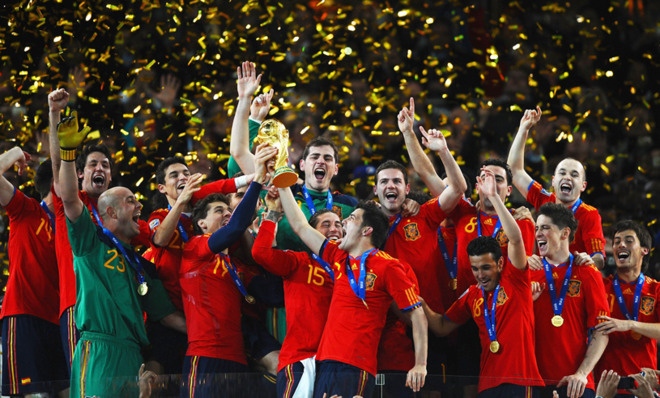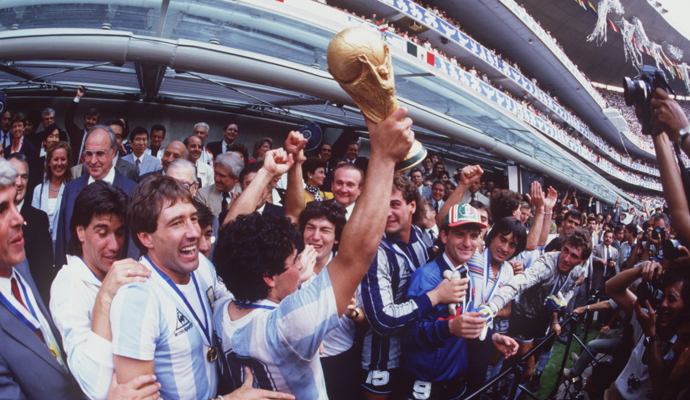Why you should watch every single match of the 2014 World Cup
To truly experience the sheer drama of the tournament, you have to go all the way


A free daily email with the biggest news stories of the day – and the best features from TheWeek.com
You are now subscribed
Your newsletter sign-up was successful
On June 12, Brazil and Croatia will play the first match of the 2014 World Cup in Sao Paolo, marking the start of another chapter in the history of our greatest sporting event. A month later, after 64 games, scores of goals, and (I predict) all 200 million Brazilians bawling their eyes out in defeat, the last team standing will hoist the FIFA World Cup Trophy and enter the pantheon of soccer immortality.
That would seem straightforward enough, as far as timelines go. But in truth the World Cup does not work like a children's fairy tale, proceeding from the first whistle to the last in linear fashion. More accurately, we should say that the World Cup has 16 beginnings, accounting for all the opening games of the 32 teams in the competition, followed by 16 more round-robin matches, and 16 more, proliferating individual storylines that then converge like roots into the trunk of the tournament, an attenuating series of matches that stretch from the round of 16 to the final.
The World Cup is a bit postmodern in that way, akin to George R.R. Martin's Game of Thrones, which is told through the perspective of more than a dozen different characters. And like Game of Thrones, the tournament can only be appreciated if all of its narrative threads are grasped. That means that if you are serious about having the best World Cup experience that television can offer, you should count on watching all the matches — every last one.
The Week
Escape your echo chamber. Get the facts behind the news, plus analysis from multiple perspectives.

Sign up for The Week's Free Newsletters
From our morning news briefing to a weekly Good News Newsletter, get the best of The Week delivered directly to your inbox.
From our morning news briefing to a weekly Good News Newsletter, get the best of The Week delivered directly to your inbox.
There are limits, of course. Chief among them is that on some days there will be two matches airing simultaneously, so if you are unable to execute a dual-screen strategy (ESPN is streaming all the games online) then you'll have to choose between them. Then there are lesser obstacles like work and family, but surely these can be negotiated for an event that, like some rare comet, arrives only once every four years. When you factor in overlapping matches, we're talking about a mere 84 hours of playing time, not even four days of your life.
I don't mean to suggest that you should treat the World Cup like an endurance test in which you plant yourself in front of the television and pin back your eyelids. Keep it on in the background as you wash the dishes. Listen to commentary while finishing up your Power Point slides. Let it wash over you in an endless stream.
Because the fact of the matter is that if you only watch the big-ticket games, or limit yourself to supporting your country, you will likely miss the most memorable moments of the World Cup. I'm not talking about fantastic goals, though there should be plenty of those. I'm talking about the high drama that only the World Cup can produce. Over the course of a single month, we will see human beings at their finest and lowest, a Dickensian cast of heroes and scoundrels, and the purest euphoria alternating with operatic swells of grief.

The history of soccer suffers from a kind of teleology, turning the 1986 World Cup, for example, into a story of a pint-sized Argentinian who marched his team to victory with his mazy runs, the best goal the game has ever seen, and the Hand of God. But there are many ways to remember a World Cup. A goal-less draw may not seem like much to memorialize, but tell that to Trinidad and Tobago, whose team in 2006 cried infectious tears of joy after earning the country's first ever point in a World Cup. You may have forgotten that Norway defeated Brazil, 2-1, in 1998 to clinch a second-round berth, but the Norwegians certainly haven't. The novelist Karl Ove Knausgaard described the moment in his book My Struggle, moving from the inner circle of his family to the center of town to convey how such an event, much like a novel, can be both deeply personal and universal at the same time:
A free daily email with the biggest news stories of the day – and the best features from TheWeek.com
I had seen the match in Molde, with Tonje's father. As soon as it was over, I called Yngve. We were both close to tears. Behind our choked voices lay an entire childhood supporting a national soccer team that had not had a sniff of success. Afterward I had gone down to the town center with Tonje, it had been full of cars honking and people waving flags. Strangers were hugging, the sounds of shouting and singing came from all corners, people were running around with flushed faces, Norway had beaten Brazil in a decisive World Cup match, and no one knew how far this team could go. The whole way maybe? [My Struggle]
It's funny to think that anyone could have believed that Norway, a mid-ranking team if there ever was one, could go the whole way. But far and away the best match of the previous World Cup in 2010 was between Uruguay and Ghana, two similarly middling teams with outlandish hopes.
Crudely speaking, the match can be boiled down to a contest between two men, Uruguay's Luis Suarez and Ghana's Asamoah Gyan, both of whom had helped lead their respective teams to the quarterfinals. Those who had paid attention from the beginning would have known that Suarez is the kind of immensely gifted young athlete who makes his debut at the World Cup before going on to earn millions in Europe's lucrative club system. (In the 2013-14 season, Suarez was the top scorer of the British Premier League, the world's most expensive league.) Gyan, meanwhile, is the kind of solid if somewhat unremarkable player who finds himself in the spotlight through sheer stout-heartedness and the whims of the soccer gods. (He currently plays in the UAE.) Americans may remember him as the sturdy forward who punctured their World Cup hopes with some serious hustle and a dagger of a strike in overtime of the second round.
With the game tied and heading toward penalties, Ghana was pressing Uruguay to the limit, promising to become the first African team to ever reach a World Cup semifinal. In the dying minutes, following a chaotic scrum in the box, a shot was struck on target. The ball was definitely going in, but Suarez, standing on the goal line, batted it away with his hands in a flagrant violation not only of the rules, but of all that's good and decent. A penalty was rewarded; Suarez was red-carded, and left the field shaking with sobs; and Gyan stepped up to the spot amidst the incessant drone of vuvuzelas.
When his shot caromed off the crossbar I literally fell out of my seat. Then the camera cut to Suarez, who was squealing and running around crazily in a transport of ecstasy. Ghana would go on to lose the penalty shootout, capping a day of exhilaration, heartbreak, and injustice.
You might ask: Why does any of this matter? Why would anyone roll around on the floor because a thousand miles away, on another continent, a ball failed to reach the back of a net?
It matters, of course, because we have chosen to let it matter. Soccer is like any endeavor we bestow with our commitment and imbue with meaning, whether it's in the realm of art, politics, or sport. It matters less what the specific framework is, than that its parameters allow us to see what we can do. So when Gyan stepped up to the spot he was not actually confronting a goalkeeper from Uruguay, much in the same way that the writer's true enemy isn't the blank page. Gyan was coming up against his own limits: his talent, his nerve, his integrity, his courage. The essence of the World Cup is watching a man come face to face with himself, on a patch of brightly illuminated green surrounded by thousands of people.
It is nothing less than astounding, then, that Gyan was the first to step up for his team when the penalty shoot-out began. Moments after making the biggest mistake of his young life, he went back to the spot — and scored.
That's why you should watch every single match of the 2014 World Cup. Because of Asamoah Gyan. Because you never know when you'll see greatness emerge from such humble material. Because all the world really is a stage, and there's no bigger one than this.
Ryu Spaeth is deputy editor at TheWeek.com. Follow him on Twitter.
-
 The Week Unwrapped: Have televised confessions quelled protests in Iran?
The Week Unwrapped: Have televised confessions quelled protests in Iran?Podcast Plus, why has Elon Musk turned from Mars to the Moon? And will the BBC prove to be a puzzles champ?
-
 The week’s best photos
The week’s best photosIn Pictures An Andean god, a rogue squirrel, and more
-
 ‘Zero trimester’ influencers believe a healthy pregnancy is a choice
‘Zero trimester’ influencers believe a healthy pregnancy is a choiceThe Explainer Is prepping during the preconception period the answer for hopeful couples?